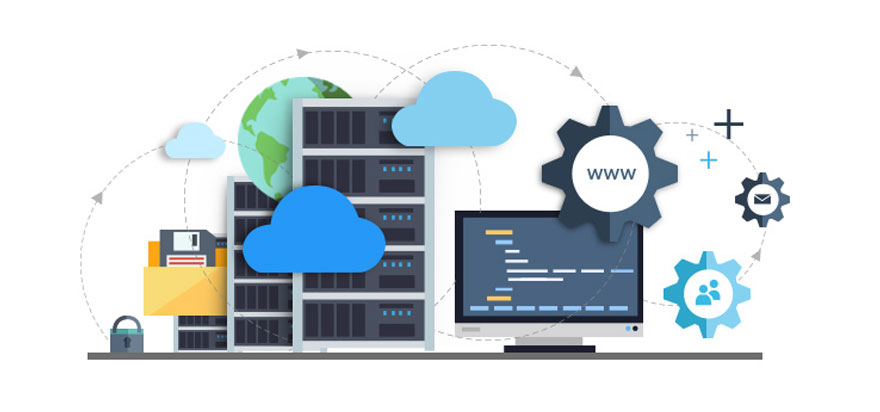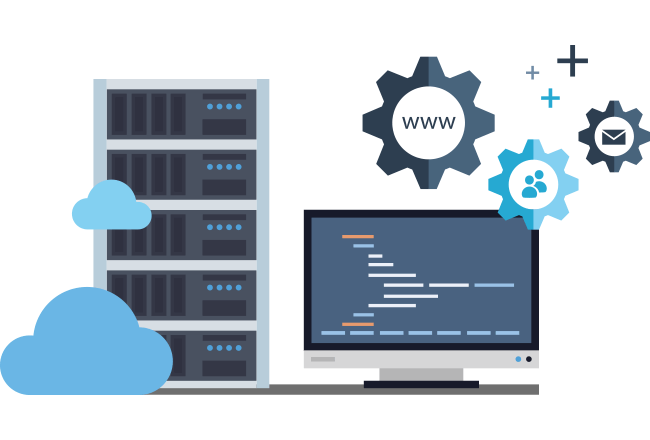
Although the cloud has become a popular choice for businesses, one challenge many companies face is how to deal with legacy apps that won’t work in a cloud environment. Essentially, these businesses are left with three choices: to continue running the apps in-house, to redesign the apps to work in the cloud or to migrate them to a managed hosting service. Which choice a company chooses depends on its budget and on its long-term needs. In this post, we‘ll look at the advantages and disadvantages of each option.
In-house hosting

Hosting legacy apps in-house can offer advantages over cloud and managed hosting. Maintaining your own datacentre gives you greater control over your system and provides easy accessibility which can be important if you run bespoke applications. Private networks can also be beneficial for those that need to comply with strict data protection and security regulations.
However, a significant disadvantage of in-house hosting is the cost. When running your own data centre, there are three types of costs which you need to bear in mind. Firstly, there is the capital expenditure needed for hardware, software licensing, network infrastructure, data storage and for the backup infrastructure. In addition, there are operational expenses, such as support for hardware, software and network infrastructure, costs for datacentre facilities and power, and ongoing staffing and training costs. Finally, there are indirect costs resulting from planned and unplanned downtime.
Redesigning apps for the cloud

If you need to host legacy apps which are not cloud compatible, there is the option to convert them for the cloud. Whilst doing this can bring all the benefits that the cloud has to offer, it can be very expensive and take a lot of time. Doing so also means overcoming quite a few technical challenges. Refactoring an application to work in the cloud can be risky as there is the potential for things to go wrong during the conversion process. If the application is not thoroughly tested in development before going live, there is the potential that you could end up in a disaster situation.
Managed hosting

An easier solution for legacy applications is managed hosting. This service comes with servers, OS, SSD or HDD storage and networking, and can include features such as cloud connectivity, managed security and bespoke technical support. You are able to build the server to a specification that is ideal for your needs and choose an operating system that is compatible with your legacy application. In addition, the hosting provider will take care of the administration, management, security and support.
One of the main benefits of managed hosting is that resources are dedicated entirely to your company. This means that you enjoy the full capabilities of all the infrastructure that you lease. Should you need more capacity, you can scale up by leasing additional servers.
Cost is another benefit. As you’ll no longer need to operate your own datacentre on-site, the savings you make will easily cover the costs of a managed hosting solution.
Besides hosting legacy applications, managed hosting is ideal for a wide number of other purposes. These include hosting web apps, analytics, big data processing, data storage and backups, disaster recovery and development ops. This means, that you do not need to lease a managed server solely for the legacy app but can move other services over too.
Managed hosting provides the performance, scalability and high availability companies need, together with built-in security that helps them comply with regulations such as GDPR and PCI DSS.
Additional advantages of managed hosting

With the increased threat of cyberattacks, the advanced security that managed hosting provides helps companies keep their systems secure at an affordable price. Cybercriminals are employing ever more sophisticated techniques to target businesses and it is crucial that companies maintain robust defences. In-house security can be costly; measures such as creating a defensive infrastructure, managing vulnerability, maintaining up to date threat intelligence and keeping data protected and applications secure don’t come cheaply – especially when you have to staff a 24-hour security team. With managed hosting, this can all be done on your behalf by your service provider. A consequence of this is that in-house IT teams are freed up to concentrate their efforts on more business-focused operations that can improve the company’s products and services.
For companies wanting to benefit from the cloud whilst still continuing to use legacy applications, managed hosting offers the benefit of cloud connectivity, giving them the ability to connect their managed servers to the public cloud or, if desired, to other datacentre locations.
Conclusion
Working with legacy apps can be a challenge. If you want to migrate to the cloud, you’ll need to go through the expensive and potentially risky route of refactoring your app, if you prefer to keep your app running in-house, you’ll continue to need costly hardware and pay for the associated maintenance, IT staff and training. Using a managed hosting solution offers a better alternative, it is less expensive, highly secure and the managed aspect of the service means your IT staff can concentrate on more important matters.




![7 Best Managed WordPress Hosting Compared [2021]](https://wpforms.com/wp-content/uploads/2019/04/best-managed-wordpress-hosting.png)












